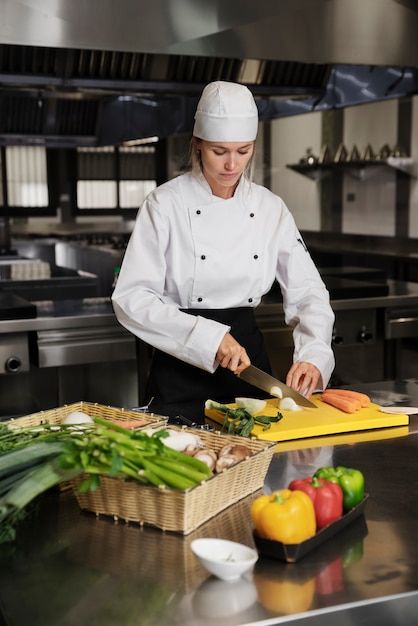10 High-Paying Jobs in Canada Without a Degree
10. Chef
A chef is a highly skilled culinary professional who specializes in preparing, cooking, and presenting food in various settings, such as restaurants, hotels, catering services, or private households. Chefs play a crucial role in the culinary industry, creating memorable dining experiences through their culinary artistry, attention to detail, and dedication to excellence. Their passion for food, creativity, and commitment to quality contribute to the success and reputation of the establishments they work for. Their yearly income ranges from $40,000 to $90,000.

Roles of a chef
- Culinary Expertise: Chefs possess extensive knowledge and expertise in culinary arts, including cooking techniques, ingredient selection, flavor combinations, and food presentation. They have a deep understanding of different cuisines, cooking styles, and cooking methods.
- Menu Planning: Chefs are responsible for creating menus that appeal to customers and align with the concept and theme of the establishment. They design dishes, plan recipes, and consider factors such as seasonality, dietary restrictions, and cost efficiency when developing menus.
- Food Preparation: Chefs oversee the preparation of ingredients, cooking processes, and plating of dishes. They ensure that food is cooked to perfection, seasoned appropriately, and presented attractively to enhance the dining experience.
- Kitchen Management: Chefs manage kitchen operations, including supervising kitchen staff, organizing work schedules, and coordinating food preparation activities. They maintain a clean and organized kitchen environment and ensure that food safety and hygiene standards are upheld.
- Quality Control: Chefs maintain high standards of food quality and consistency in all dishes served. They taste and evaluate dishes, provide feedback to kitchen staff, and make adjustments to recipes or cooking techniques as needed to meet quality standards.
- Creativity and Innovation: Chefs demonstrate creativity and innovation in developing new dishes, experimenting with ingredients, and incorporating unique culinary concepts. They stay current with food trends and techniques to offer fresh and exciting dining experiences to customers.
- Time Management: Chefs must work efficiently in a fast-paced kitchen environment to ensure that dishes are prepared and served in a timely manner. They prioritize tasks, coordinate multiple cooking processes, and manage kitchen resources effectively to meet service demands.
- Collaboration: Chefs collaborate with kitchen staff, servers, suppliers, and other professionals to ensure smooth kitchen operations and exceptional dining experiences. They communicate effectively, delegate tasks, and foster teamwork in the kitchen.
- Continuous Learning: Many chefs engage in ongoing training, culinary courses, and professional development to expand their skills, stay updated on industry trends, and refine their culinary techniques.